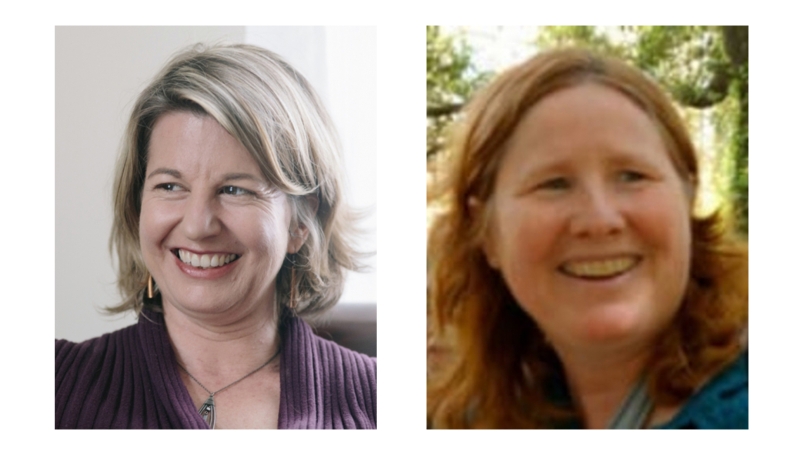
Students in Professors Bethany Moreton (left) and Pamela Voekel's fall classes organized a panel of professors, activists, and farmers across North and South America to speak on water crises, land management, and climate justice.
A group of students in Professors Bethany Moreton's and Pamela Voekel's Fall 2022 classes invited and organized a panel of professors, activists, and farmers across North and South America to speak on water crises, land management, and climate justice in Filene Auditorium on October 25, 2022. Over 90 students shared dinner beforehand and then gathered in the auditorium for the panel discussion, which included Professors Moreton and Voekel, five guest speakers, and Q&A with the students. Focusing on the political ecology of water access, this discussion invoked environmental paradigms and histories of dispossession in understanding the racial and economic disparities underlying the climate crisis today.
Panelists included:
Lorena Quiroz is the founder of the Immigrant Alliance for Justice and Equity in Jackson, Mississippi. Born in Ecuador and raised in New York, she is a 22-year Mississippi resident, organizer, and mother to three girls. By providing water safety education and distributing resources first-hand, the Alliance serves to amplify voices of marginalized, multi-racial, and immigrant communities by active participation in civic engagement. Grappling with white flight, white supremacy, and disinvestment, Lorena works to deconstruct barriers that perpetuate racial, xenophobic, gender, and socio-economic disparities and oppression.
Delfín Montañana Palacios Semblanza is a Professor in Projects for Urban Development from the Universidad Iberoamericana (UIA) and Biologist from the Faculty of Sciences of the National Autonomous University of Mexico (UNAM). He is the director of the Department of Socio-environmental Education in Isla Urbana, where he also coordinates the cultural-artistic activities program La Carpa Azul. Isla Urbana is a non-profit that has dedicated over 11 years to advocating for water sustainability in Mexico. They have extensive experience in technological development and in the implementation of rainwater harvesting, water management and water autonomy projects. With more than 25,000 rainwater harvesting systems installed in Mexico and other Latin American countries, Isla Urbana has received numerous recognitions and awards, both nationally and internationally, for social innovation and for their contributions in changing water management paradigms.
Don Paco is a farmer, poet, and former accountant originally from Hidalgo, Mexico. After nearly fifteen years with his former bank, he was fired. Shortly after, he planned his departure for the United States. Don Paco successfully paid for his daughter's college degree in Mexico, after working an average of 74 hours a week at a dairy farm - checking the milking systems, maintaining machinery, and meeting quality standards of buyers. Don Paco is in his third semester at the University of Massachusetts, after obtaining his GED and diploma from the State of Vermont. Today, he helps manage the farm. More recently, he started writing poetry on climate justice and environmental sustainability in English and Spanish.
Charitie Ropati (Yup'ik in Samoan) is a 21-year-old researcher, civil engineer, and activist studying the intersections of plant ecology, permafrost, and cultural resilience in coastal Native communities at Columbia University in the Griffin Lab. They also work on the Co-production of knowledge as a member of the Earth Network at the Columbia Climate School. They were awarded Champion for Change by the Center for Native American Youth for their work in education access and they have been featured and nationally recognized for their advocacy by the Malala Fund and in Teen Vogue, The Guardian, and elsewhere.
Sarah Hines is an assistant professor in the Department of History at the University of Oklahoma, specializing in Latin American History with an emphasis on the environment, race and ethnicity, and social movements. Her first book Water for All: Community, Property, and Revolution in Modern Bolivia is a history of social struggle over water access and hydraulic engineering in the Cochabamba region from the late nineteenth century to the early twenty-first century. Her book evolved out of her dissertation which won the UC Berkeley History Department Dissertation Prize and the New England Council of Latin American Studies Dissertation Prize.
The Department of History would like to thank alumni for their support of the History Academic Enrichment Fund, which funded this event.